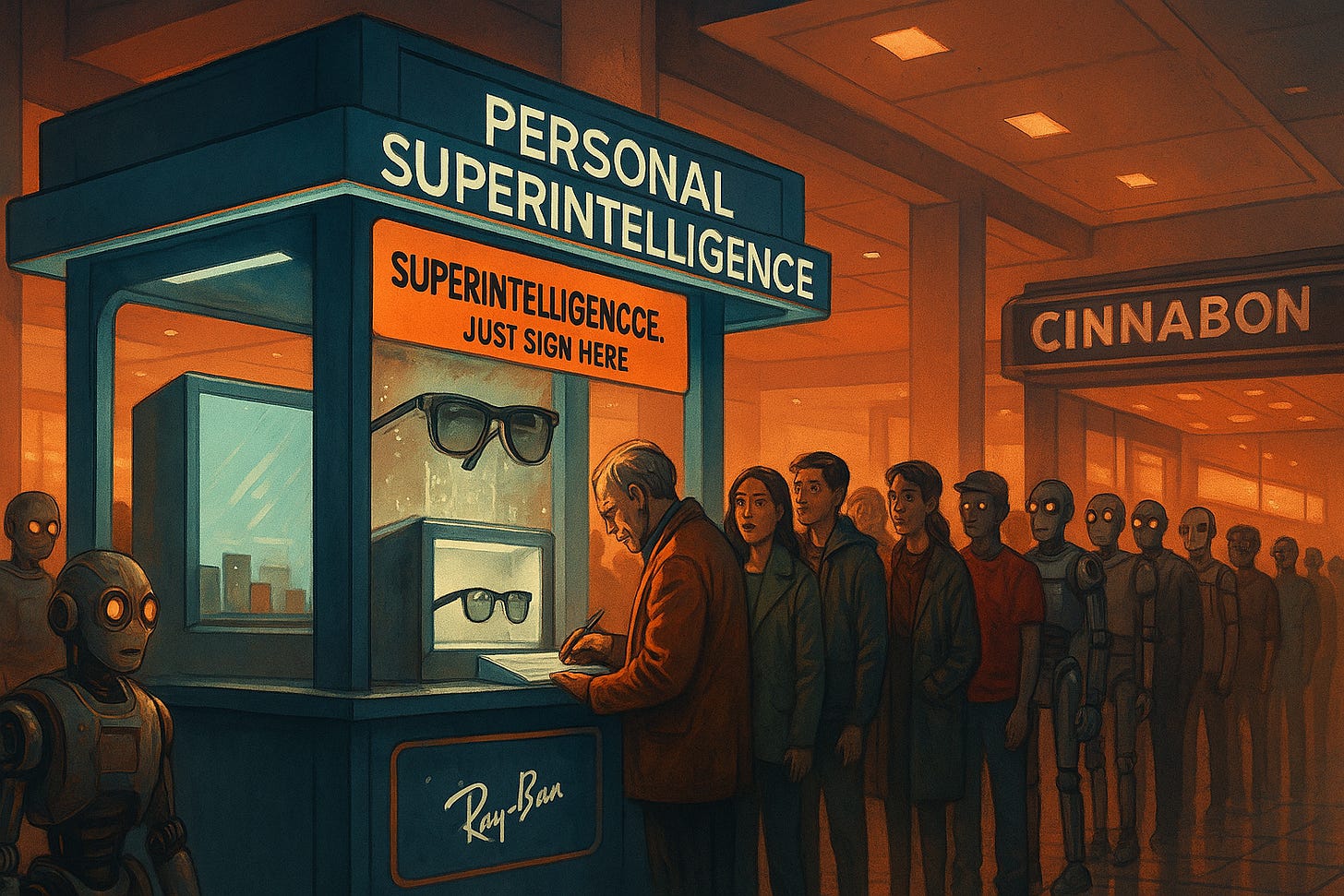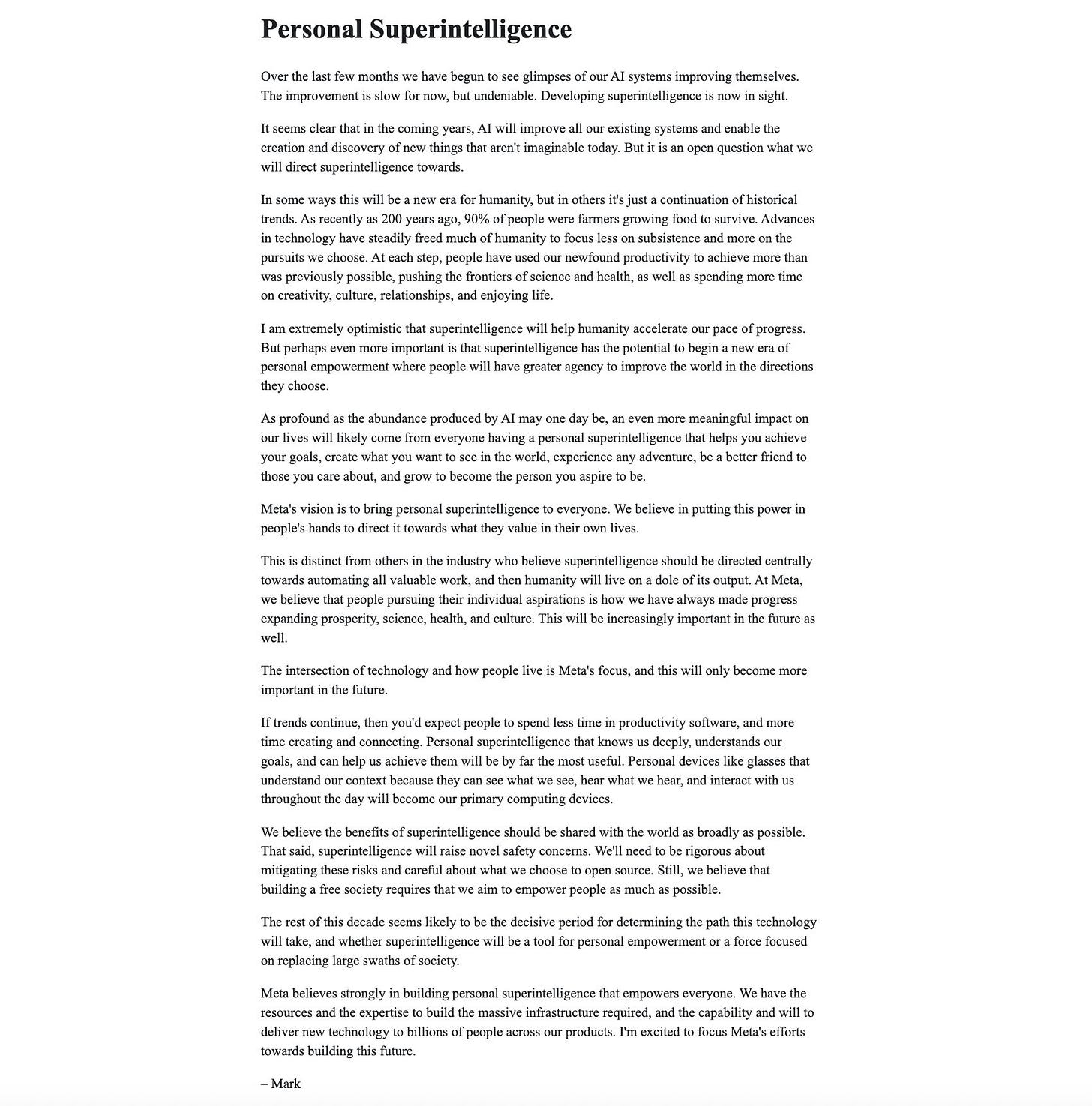Meta's Personal Superintelligence: AGI with Better PR
Same existential risk, better onboarding. Now with 80% less doom, 100% more wearable.
This morning, Mark Zuckerberg published a sweeping letter on Meta’s AI ambitions - and it’s worth your time.
At first glance, it’s a mission statement. A warm, empowering vision of “personal superintelligence” designed to help you think better, create more, and deepen your relationships. But read between the lines, and it’s also a pre-earnings investor memo, a subtle dig at competitors, and a full-blown rebranding campaign.
Let’s start with the core provocation: Meta positions as
“distinct from others in the industry who believe superintelligence should be directed centrally towards automating all valuable work, and then humanity will live on a dole of its output”
That’s a pointed jab at the OpenAI/Anthropic worldview - and a bid to position Meta as the AI lab that’s “on the side of the people.” Not building a godlike overlord, but a loyal sidekick. Perhaps if we rename the dragon, it won’t breathe fire.
I’m not one to project altruism onto trillion-dollar firms. But strategically, it’s a savvy reframing. By calling it personal intelligence, Zuck sidesteps the loaded language of AGI and ASI. He also controls the comparison set: not enterprise copilots (where Meta lags Microsoft/OpenAI), but a new category altogether - consumer-native, device-embedded AI that lives on your face and whispers in your ear.
The letter doesn’t say “we are terrified of missing the next platform shift,” but you can sort of hear it humming in the background. Will it land? That depends. Here’s what stood out to me:
Self-improving systems are in sight
“Over the last few months we have begun to see glimpses of our AI systems improving themselves. The improvement is slow for now, but undeniable. Developing superintelligence is now in sight.”
This line won’t make headlines - but it should. It quietly affirms a growing belief among insiders: that we’re entering a phase of recursive capability gain. Zuck is putting Meta on the record: superintelligence isn’t a “someday” ambition. It’s a 5-to-10-year roadmap.
And he’s not alone. Dario Amodei has publicly said ASI is possible within 2–3 years of AGI. Demis Hassabis says it may arrive “this decade.” The next half-decade will be critical not just for developing these systems - but for deciding who controls them and how they're aligned. That fight is unfolding now, in compute, in model access, and in messaging like this.
The language shift is the strategy
Zuck’s team is doing a masterclass in narrative repositioning:
“Personal superintelligence” → softer than AGI, friendlier than “frontier models”
“Empowerment, creativity, relationships” → not replacing jobs, but enhancing life
Smart glasses as the interface → ties AI to Meta’s hardware moat (Ray-Bans, Orion), and justifies AR/VR spend most had written off
The goal: emotional proximity. Make AI feel less like a sci-fi god model in the cloud and more like a trusted companion that lives in your glasses. (And ideally, gets upgraded every year.)
Open-ish source and the safety sleight of hand
Zuck explains Meta’s shift away from radical openness like this:
“We believe the benefits of superintelligence should be shared… That said, superintelligence will raise novel safety concerns.”
There’s always a “that said.” Translation: LLaMA was fun, but we’re not open-sourcing the big one. It’s a calculated pivot - acknowledge the safety discourse without alienating developers. But it’s also a signal of where the industry is heading: as capability grows, the windows close.
Understand the audience, understand the message
This letter is doing a lot of work. It says to:
Investors: “Yes, we’re burning billions on Scale AI, mega comps, and massive GPU farms. But it’s not speculative. It’s a bet on a generational TAM: smartglasses + assistants + services = the next consumer platform.”
Researchers: “Come to Meta. We have compute, autonomy, CEO backing - and a warm, mission-driven story about helping humans, not chasing benchmarks.”
Regulators: “We care about safety, we’re being responsible, and we’re definitely not plotting AGI in secret.”
Consumers: “You don’t trust us. Fair. But this isn’t legless avatars in a cartoon metaverse. It’s a smart assistant that lives in your Ray-Bans and helps you get through the day. This time, it’s about you. And no, we’re not selling your brain data.”
Meta employees: “We know you’re tired. Things have been chaotic and morale has been low. Here’s your north star. No more crypto pivots or VR whiplash. This is the mission.”
The problem? Zuck isn’t the guy you buy intimacy from.
After Cambridge Analytica, after content scandals, after the metaverse misadventure - consumers don’t default to “trust” when they see Meta. So now, the guy who scaled social media wants to build the most intimate product ever - a voice in your glasses that knows what you care about.
It’s bold. But boldness doesn’t equal credibility. Trust is earned. Slowly.
This is Meta’s most ambitious framing yet. It’s also their most coherent attempt yet to stitch together its long‑suffering hardware bets (smart glasses), its hiring war (billion‑dollar comp packages), and its AI infrastructure buildout (a GPU pile large enough to bend gravity) into a single, warm, consumer-friendly thesis.
Zuck doesn’t want to just build the most powerful AI. He wants it to lives inside your head. And if he gets it right, you won’t even notice the shift, until your glasses whisper, “Your 2pm is here,” and you thank them.
Meta reports earnings later today. Let’s see if the data matches the dream.




You’re a sharp voice covering AI. Keep going!
Well dissected. I am curious apart from the trust issue with Zuck, how would this stack over all vis-a-vis the Meta pivot a few years ago.
The vision
The memo
The strategy & then
The execution
I think Zuck himself is showing quite some evolution.